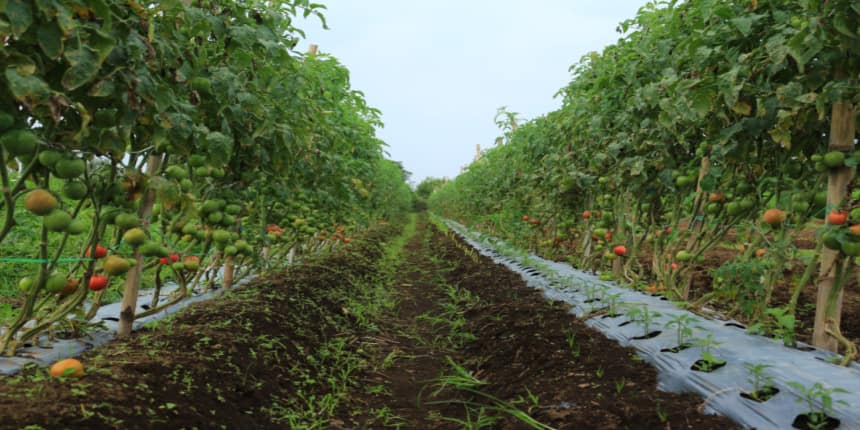ZBNF Full Form
What is Full Form of ZBNF ?
ZBNF stands for Zero Budget Natural Farming which aims to use no fertilisers and pesticides for agricultural crops and opt for traditional crop practices. The word "Zero budget" here refers to zero production cost for crops. A program has also been launched by the government of India known as Paramparagat Krishi Vikas Yojana(PKVY), promoting organic farming, chemical-free agricultural methods, and ZBNF.
- What is Full Form of ZBNF ?
- Points In Favour Of ZBNF
- Principles Of ZBNF
- Benefits Of ZBNF
- ZBNF- Cropping Model
- Pilot Study On Zero-Budget Natural Farming
- Schemes That Support ZBNF
- Way Forward for ZBNF
- Criticism Faced By ZBNF

Finance Minister Nirmala Sitharaman mentioned "Zero Budget Natural Farming" in her 2019 budget speech and described it as a way to double farmers' incomes. Due to this reason, this idea grabbed attention.
Points In Favour Of ZBNF
Several farmers are using this technique in different areas and climates.
For the growth of plants, whatever is needed is present in nature itself, no need to add chemicals.
Small farmers who use this technique can be free from loans.
It suits all crops in all agro-climatic zones.
Principles Of ZBNF
Mixed cropping.
Minimum soil disturbance.
Zero external inputs.
Use plant extracts to control pests.
No harmful pesticides or fertilisers.
More organic matter in the soil.
Soil should be covered with crops throughout the year.
Use of biostimulants as necessary catalysts.
Use of indigenous seeds.
Integration of trees into the farm.
Water and moisture conservation.
Integrate animals into farming.
Benefits Of ZBNF
It uses 50-60% less water than standard farming techniques.
It has low cultivation costs.
It helps to reduce methane emissions.
It's environmentally friendly and produces organic yield.
It can also avoid residue burning by practising mulching.
ZBNF- Cropping Model
The model is based on cultivating poly crops, or growing short-duration and long-duration crops (main crop) together, in order to recover the cost of raising the main crops from the income generated from the short-duration crops, resulting in "zero" expenditure for the main crop.
Pilot Study On Zero-Budget Natural Farming
A study on the evaluation of zero-budget natural farming methods in the Basmati/coarse rice-wheat system has been started by the Indian Council of Agriculture Research through the ICAR-Indian Institute of Farming Systems Research at four locations, including Modipuram (UP), Pantnagar (Uttrakhand), Ludhiana (Pb), and Kurukshetra (Haryana).
Additionally, in August 2019, the National Academy of Agricultural Sciences (NAAS) conducted a brainstorming session on zero-budget natural farming.
Schemes That Support ZBNF
The Agriculture Infrastructure Fund (AIF) of Atma Nirbhar Bharat offers financing to State agencies, Primary Agricultural Credit Societies, Farmer Producer Organizations, businesspeople, etc., for the establishment of organic input production units, community farming assets, and post-harvest infrastructure for value-addition to organic products.
Financial aid at a 50% subsidy to the tune of Rs. 300/- per hectare is offered under the National Mission on Oilseeds and Oil Palm (NMOOP) and National Food Security Mission (NFSM) for the usage of organic inputs.
DARE/ICAR is doing research in 20 centres across 16 states as part of its Plan Scheme "Network Project on Organic Farming (NPOF)" to create a location-specific organic farming package of methods for crops and cropping systems. A set of organic farming methods for 51 crops/cropping systems has been created to offer technical support to the line departments' scheme implemented in the country.
To the tune of Rs. 190.00 Lakh/Unit (capacity of 3000 tonne/annum of finished compost), full financial support is given to State Governments and Government Agencies through the Capital Investment Subsidy Scheme (CISS) of the Soil Health Management Scheme for the establishment of mechanised fruit and vegetable markets or waste/agro waste compost production. Similarly, up to 33% of the cost, restricted to Rs. 63 lakh/unit as capital investment, is granted for individuals and commercial organisations.
The Mission Organic Value Chain Development for North Eastern Region (MOVCD-NER) encourages farmer producer organisations (FPOs) in the region to grow specialised crops that are organically certified by a third party with an aim to export. For three years, farmers will receive support in the amount of Rs. 25000/ha for organic inputs like biofertilizers and organic manure. Under the programme, assistance is also offered for the creation of FPOs, capacity building, and post-harvest infrastructure up to Rs. 2 crores.
Way Forward for ZBNF
One of the main contributions of the ZBNF approach is NITI Aayog.
In order to determine whether more public funding assistance for ZBNF is necessary, the experience of the Andhra Pradesh Government is also being closely examined.
The Indian Council of Agricultural Research is examining the effects of the ZBNF method, used by some basmati and wheat growers in India, on production, economics, and the health of the soil, including soil organic carbon and soil fertility.
If the experiment proves to be a success, a legal method must be developed to spread the technology among farmers.
Criticism Faced By ZBNF
It is not accepted in the scientific community as there is no scientific validation of the techniques used.
The maintenance of local cow breeds is difficult.
It will be more difficult for the crops planted by Zero Budget Natural Farming to get organic certification, which could make it more difficult to sell the products to organic companies.